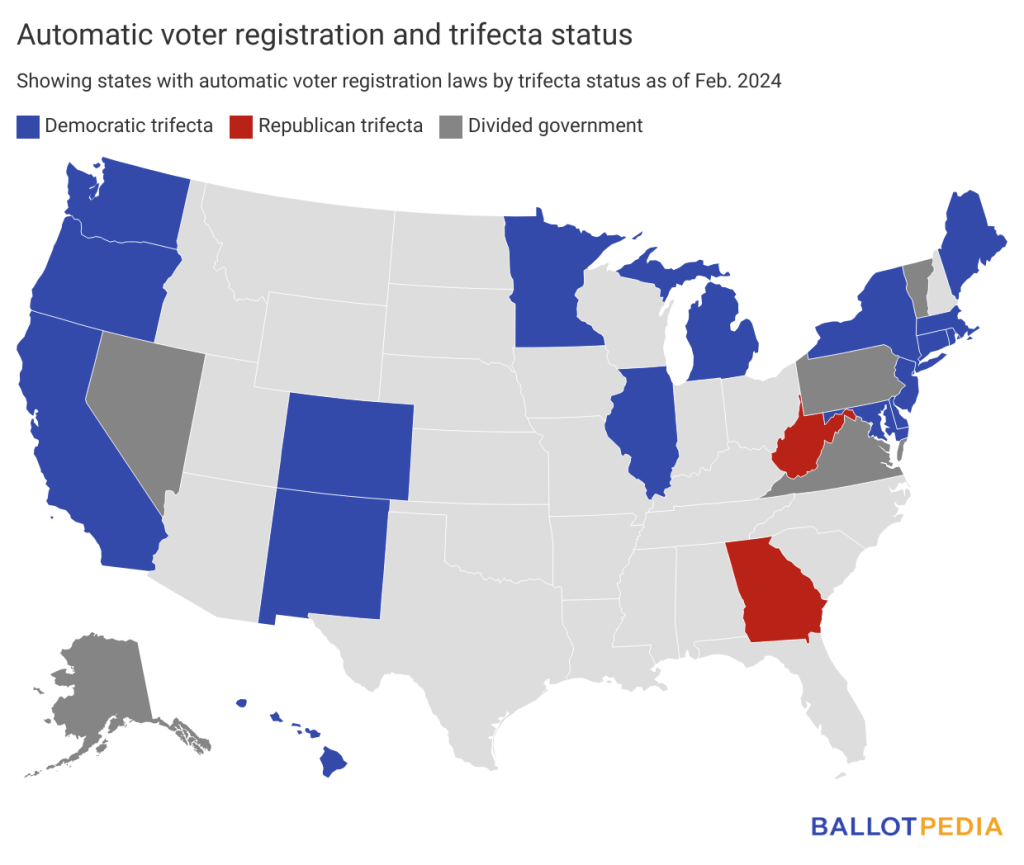There are 370 active bills in the legislature of 37 states that deal with voter registration, making up more than 10% of all election-related legislation tracked by Ballotpedia this year, as of Feb. 22. Of these bills, legislators introduced 213 since the beginning of the year, while the remainder were carried over from last year’s sessions.
Democratic legislators have introduced the majority of voter registration bills (191) across all states. Similarly, legislators have introduced more bills dealing with voter registration in Democratic trifecta states than in states with Republican trifectas or divided governments.
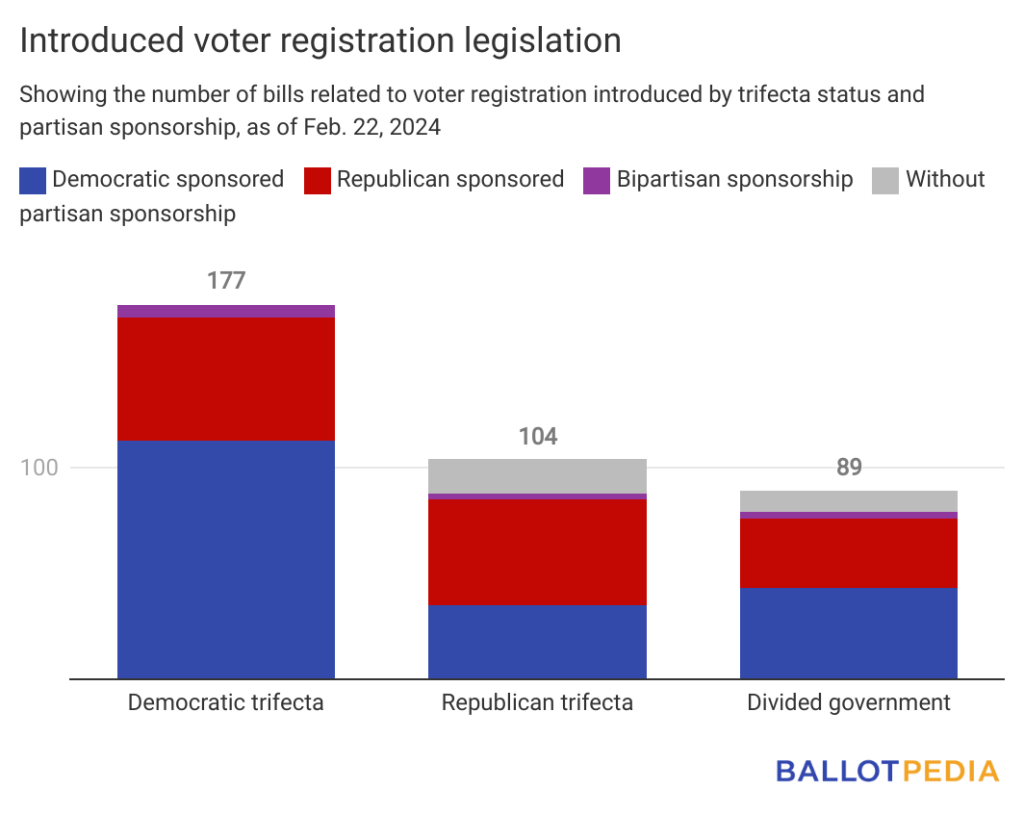
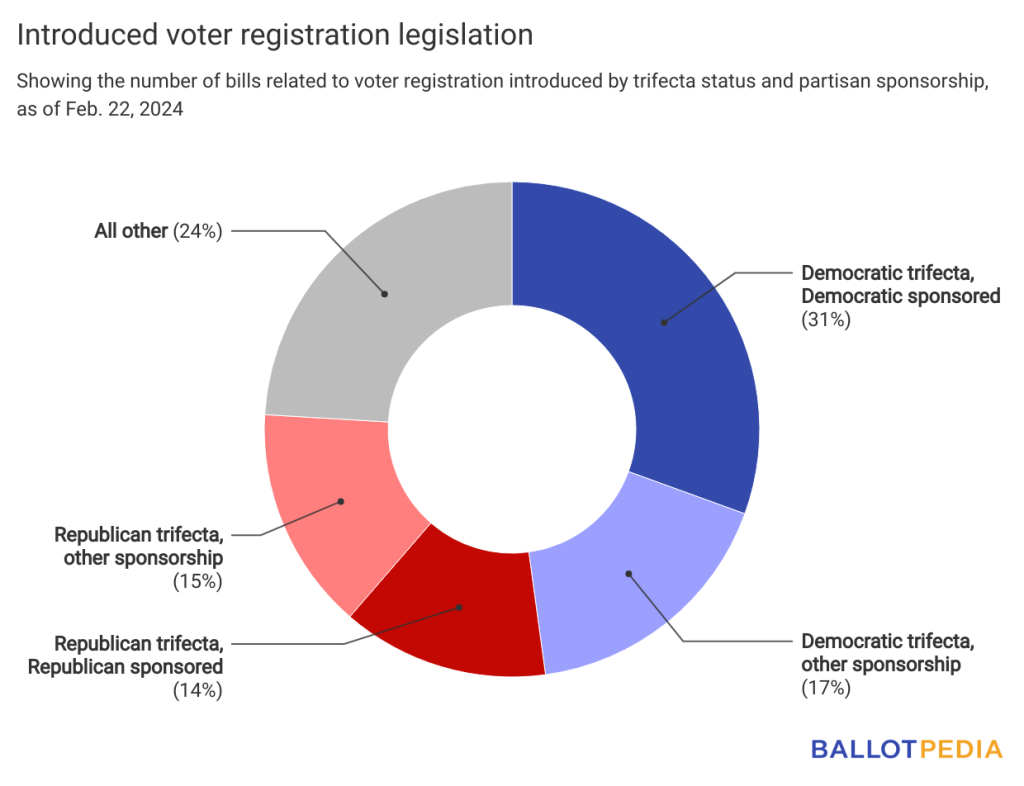
Ballotpedia classifies bills related to voter registration into five distinct categories, with certain bills included in more than one grouping: Automatic voter registration (55 bills), Availability of state voter files (9), Same-day/Election day registration (35), Voter list maintenance (129), and Voter registration (236).
Moving bills
Only one voter registration bill has been enacted so far this year, South Dakota’s SB21, which makes a technical change to voter registration reporting requirements.
Two bills have passed both chambers of a state legislature. Florida’s H7003 exempts 16 and 17-year old pre-registered voters’ information from public record requests, and allows use of that same information by government entities as necessary for that entity to carry out official responsibilities. The bill passed the Florida House 118-0 on Jan. 24, and the State Senate 40-0 on Feb. 1.
Wisconsin’s AB572 requires the state’s election commission to notify a previously ineligible voter whose right to vote has been restored that they must complete a new voter registration application, and makes other changes related to ineligible voters. The legislation passed the Wisconsin State Assembly under unanimous consent on Nov. 9, 2023, and the State Senate 22-10 on Feb. 13.
Thirty bills have passed one chamber of a state legislature, including seven in Virginia, four in West Virginia, three in New York, and two each in Arizona, California, Indiana, South Dakota, and Wisconsin.
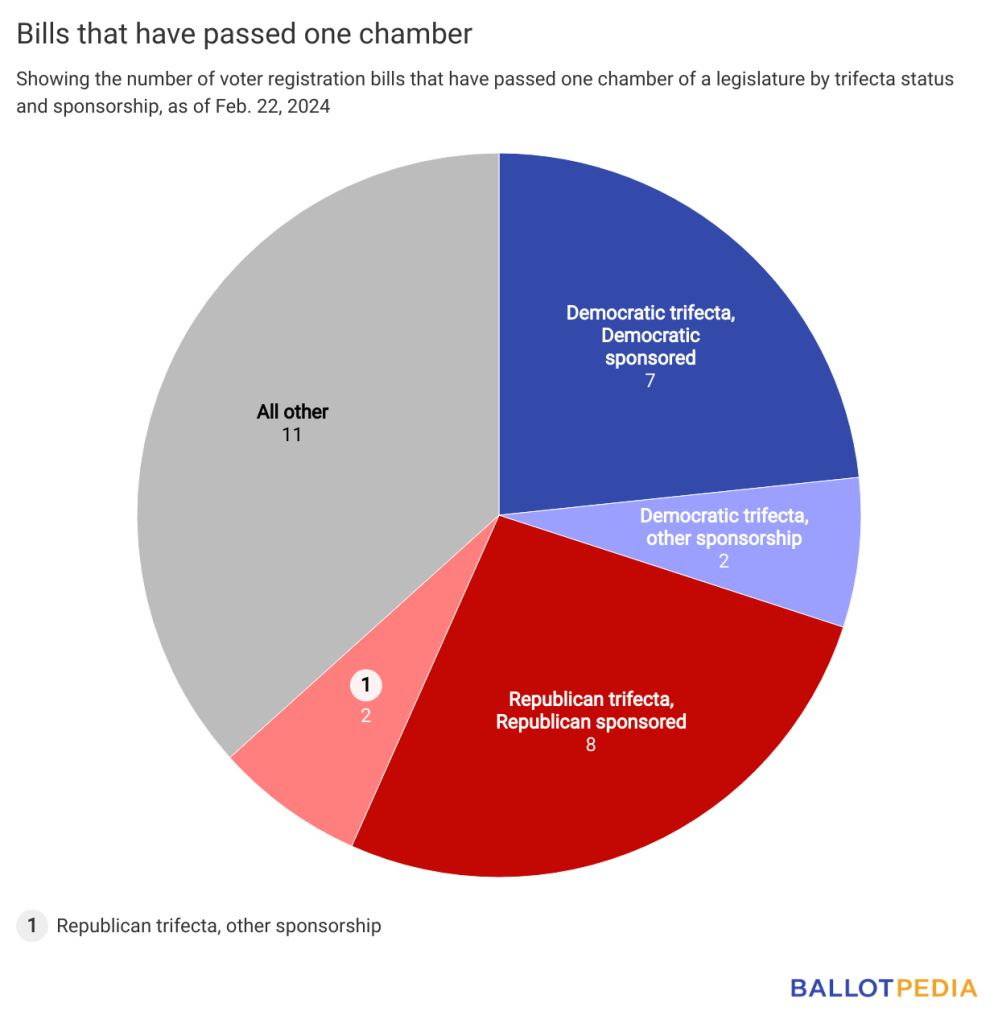
Noteworthy legislation that has passed one chamber includes Indiana’s HB1264. The bill adds new requirements to the voter registration application process and changes voter list maintenance procedures, including allowing officials to obtain commercially available data from a credit agency for voter address verification. The bill passed the Indiana House of Representatives 67-29 on Jan. 31.
Voter list maintenance
In addition to Indiana, 26 other states are considering modifying their voter list maintenance laws.
Included in this group are several states, Florida, Missouri, Virginia, and West Virginia, that recently withdrew from the Electronic Registration Information Center (ERIC), a multi-state voter list maintenance compact. The bulk of such legislation in these states relates to establishing new list maintenance procedures, such as S1602 in Florida which requires election officials to conduct a quarterly review of voter registration rolls using data from other state agencies. Some bills, however, seek to reverse withdrawal, such as Virginia’s HB1177 which would require Virginia to re-apply to ERIC. That bill passed the Virginia House of Delegates 50-48 on Feb. 13. One other bill, California’s AB2050 and Hawaii’s SB2240, would require those states to apply to ERIC.
Other notable list maintenance bills include Arizona’s HB2590 which would require counties to participate in a statewide voter registration database, instead of operating individual county databases approved by the secretary of state. The bill passed the state’s lower chamber 39-18 on Feb. 13.
Pre-registration
Bills in at least four states, Alaska, Illinois, Kansas, and New Jersey would allow 16 or 17-year-olds to register to vote. A bill in Maryland, HB436, would lower the registration age to 15 and 9 months, the same age at which a teenager can apply for a learner’s permit. That bill passed the Maryland House of Delegates 106-32 on Feb. 22. Elsewhere, bills in at least four states, Arizona, Kansas, Maryland and New York, would lower the voting age to 16-years-old for at least some elections. Democratic legislators sponsored all of these bills.
Eighteen states and the District of Columbia allow 16 year-olds to pre-register to vote, while three other states permit 17 year-olds to do so.
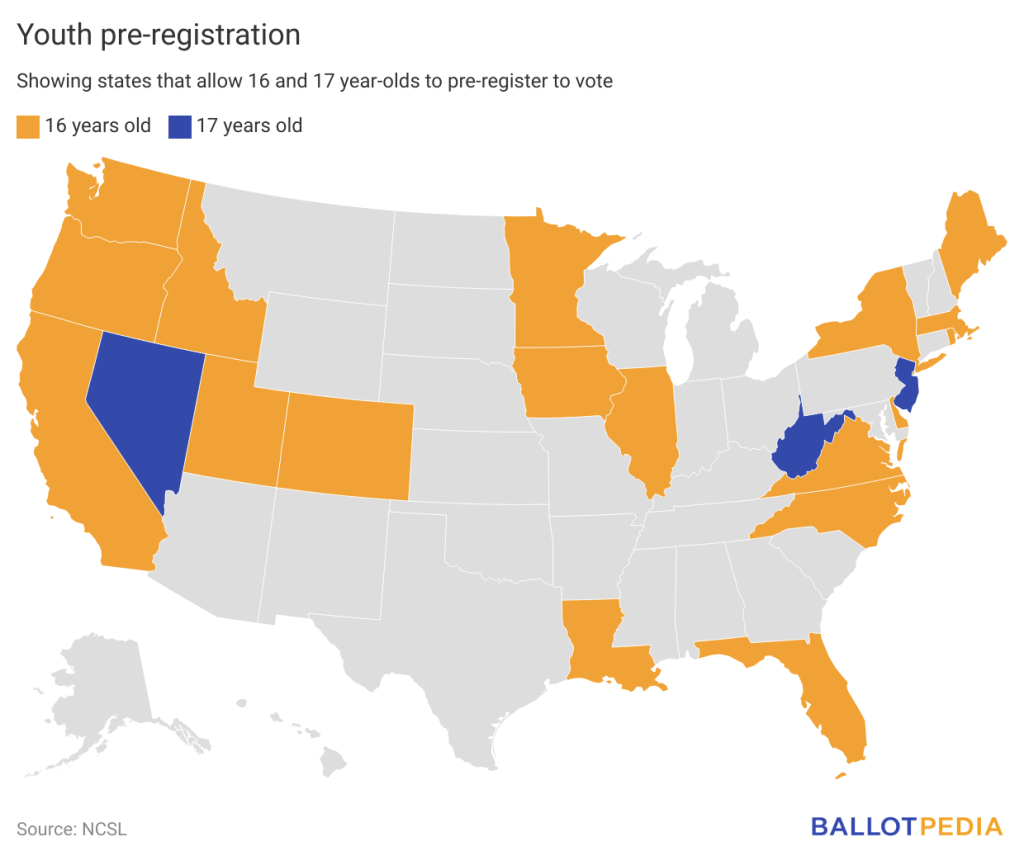
Same-day registration
Active legislation in eight states would establish some form of Election Day, or same-day, registration. Democrats sponsored all but one of these bills, doing so in Arizona, Kansas, Missouri, North Carolina, New Jersey, New York, and Pennsylvania. The remaining bill, Massachusetts’ S407 has bipartisan sponsorship. None of these bills have advanced yet this year.
Twenty-two states and the District of Columbia have same-day registration. North Carolina is the only state that offers same-day registration during the early voting period, but not on Election Day.
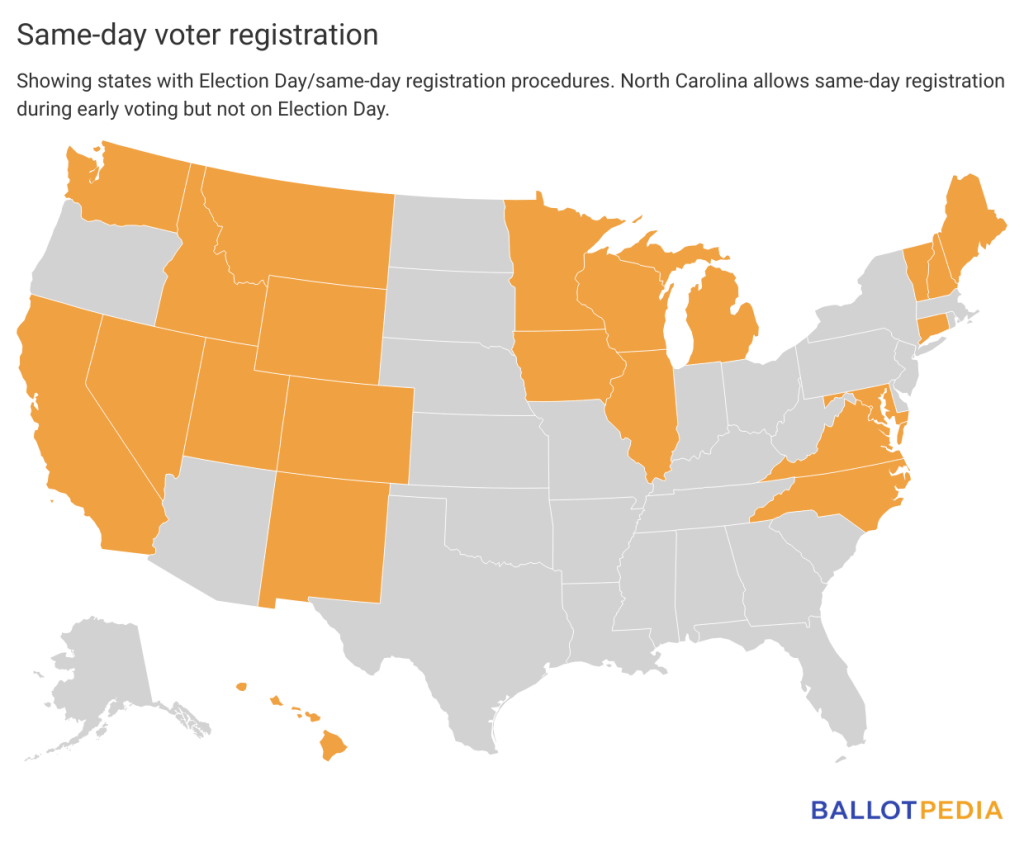
Automatic registration
Bills in nine states would establish automatic voter registration procedures. In an automatic voter registration system, eligible voters are automatically registered to vote when they interact with and provide identifying information to certain government agencies (e.g., departments of motor vehicles). Eligible voters are registered by default, although they may request not to be registered.
Of the nine states with active legislation that would create automatic voter registration, three have divided governments (Arizona, North Carolina, Wisconsin), while the remaining six have Republican trifectas (Iowa, Indiana, Missouri, Mississippi, Nebraska, South Carolina). All but one of these bills was introduced and sponsored by Democrats; in Nebraska legislators are nonpartisan.
Elsewhere, Republican-sponsored bills in three states would roll back existing automatic registration laws: Georgia’s SB221, New Jersey’s S2575, and West Virginia’s HB4467.
Twenty-four states and D.C. have automatic voter registration laws. Of these states, two have Republican trifectas, five have divided governments, and the remaining 17 have Democratic trifectas.
